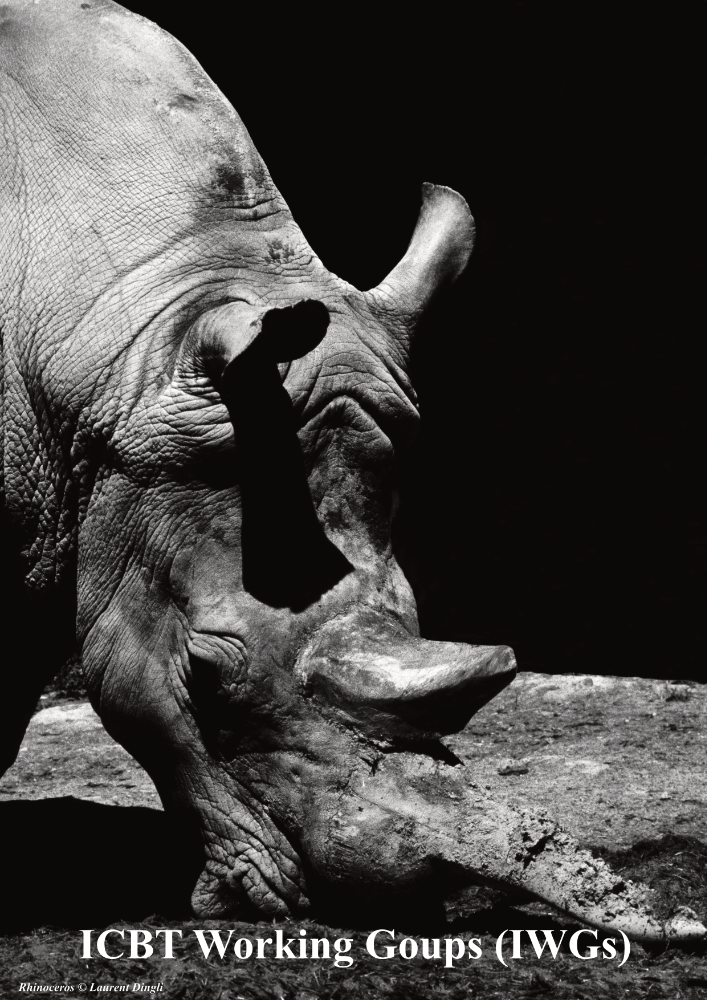
Presentation
If you have an expertise in the topics mentioned below and want to participate in one or several ICBT Working Group sessions, you can register by filling the form at the end of the page. As the form doesn’t allow to select several choices, please select one and then, if needed, mention your additional choice in the comment.
The loss of natural habitats due to human activities, the increase in health crises and the link between these and other major threats such as the collapse of biodiversity and climate change are leading us to rethink urgently our relationship with nature.
This is why the ICBT has decided to set up regular Working Groups on biodiversity-related topics — One Health-One Welfare, Climate Change, Wildlife Trade, Human-wildlife Interaction/Conflict, Rescue & Rehabilitation, Animal & Law, Education & Information — with the ambition of reaching a large audience and influencing public policy.
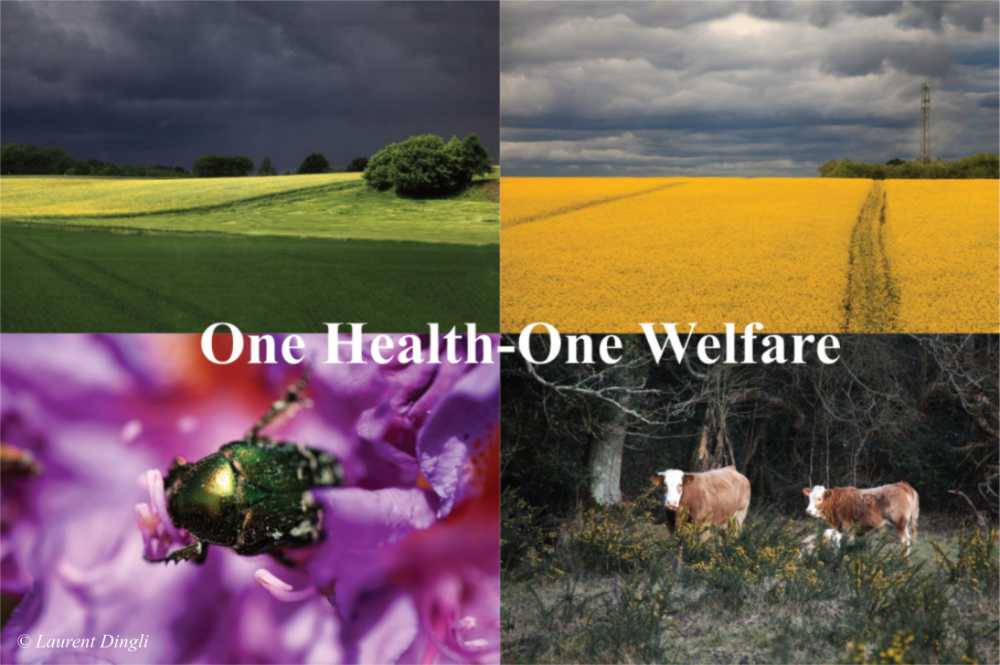
Topic
One Health is an approach calling for “the collaborative efforts of multiple disciplines working locally, nationally, and globally, to attain optimal health for people, animals and our environment” [OHITF]. The emergence of health risks requires indeed joint management and cross-disciplinary action. The “One Welfare” concept is the extension of this approach. It recognises the interdependencies between animal welfare, the welfare of other animal species, biodiversity and environment quality. ‘Both concepts are based on the foundational idea that humans, other animals (wild and domestic) and the environment are interconnected and interdependent […] Taken together, One Health and One Welfare can give us a way to think about forging a healthier path away from the widespread destruction that Homo sapiens alone, of the more than 8 million known species on earth (Zimmer, 2011), has caused and that imperils not only our survival but that of all other living species.’ [Lindenmayer and Kaufman, 2021].
With the support of our members and partners, ICBT wants to take stock of the situation and propose solutions during its regular working groups through several subgroups or modules which are intertwined: land/ocean use and conservation (agriculture systems, food security, deforestation, rewilding, overfishing, species conservation in their biotopes); Ecosystem Health (Lab & field research); Work with local and indigenous communities.
Beyond the often alarming observations concerning the loss of biodiversity and the degradation of environment, we wish to adopt a positive perspective, envisaging concrete solutions, some of which have already been put into practice in the field by our members, particularly in Asia and Africa.
This Working Group aims to review in simple terms the state of academic research and field observation, and to discuss ways of mitigating the risks of epidemics while preserving biodiversity and taking into account animal welfare and the needs of human communities and their natural environment.
Members
Dr. Gladys Kalema-Zikusoka, Ugandan wildlife veterinarian, founder and CEO of Conservation Through Public Health (CTPH) and Gorilla Conservation Coffee. Dr Serge Morand, Health Ecologist and Biologist, member French CNRS, Faculty of Veterinary Technology (Kasetsart University, Thailand), invited Professor at the Faculty of Tropical Medicine (Mahidol University). Linda Wong, deputy Secretary General China Biodiversity Conservation & Green Development Foundation (CBCGDF). Pei F. Su, Founding President ACTAsia. Jenny and Dr James Desmond, co-founder Liberia Chimpanzee Rescue & Protection (LCRP). Dr Lynne Sneddon, expert in aquatic animal biology and welfare, University of Gothenburg, Sweden. Philip Lymbery, Global CEO Compassion in World Farming (CIWF) International, Visiting Professor at the University of Winchester, President of Eurogroup for Animals. Ahmad Muhamud Osman, Senior Adviser Ministry of Environment and Climate Change of the Republic of Somalia. Tanvir Ahmed, Wildlife Biologist, Nature Conservation Management, Bangladesh (NACOM), Founder, Phayre’s Langur Conservation Initiative in Bangladesh, Commission Member, IUCN SSC Primate Specialist Group (PSG), HPI Assistant to Editors, Asian Primates Journal.
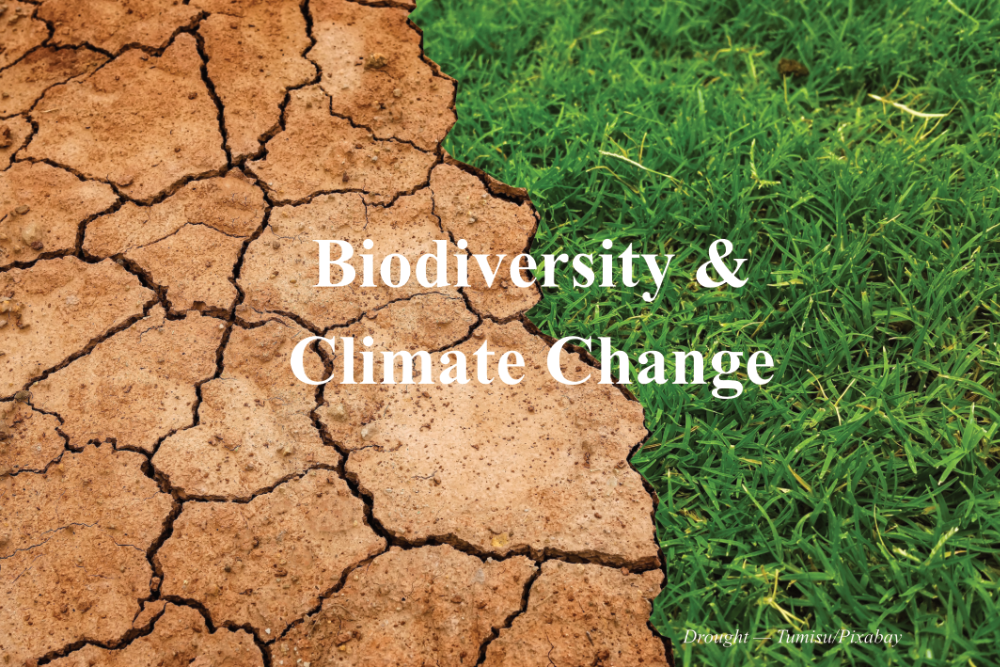
Topic
The main driver of biodiversity loss remains humans’ use of land – primarily for food production. Human activity has already altered over 70 per cent of all ice-free land. When land is converted for agriculture, some animal and plant species may lose their habitat and face extinction.
But climate change is playing an increasingly important role in the decline of biodiversity. Climate change has altered marine, terrestrial, and freshwater ecosystems around the world. It has caused the loss of local species, increased diseases, and driven mass mortality of plants and animals, resulting in the first climate-driven extinctions.
On land, higher temperatures have forced animals and plants to move to higher elevations or higher latitudes, many moving towards the Earth’s poles, with far-reaching consequences for ecosystems. The risk of species extinction increases with every degree of warming.
Land and ocean ecosystems – and the biodiversity they contain – are natural carbon sinks, providing so-called nature-based solutions to climate change.
Members
Tanvir Ahmed, Wildlife Biologist, Nature Conservation Management, Bangladesh (NACOM), Founder, Phayre’s Langur Conservation Initiative in Bangladesh, Commission Member, IUCN SSC Primate Specialist Group (PSG), HPIAssistant to Editors, Asian Primates Journal. Deba Kumar Dutta, conservation biologist, Coordinator of WWF-India.

Topic
Wildlife trade refers to the products that are derived from non-domesticated animals or plants usually extracted from their natural environment or raised under controlled conditions. It can involve the trade of living or dead individuals, tissues such as skins, bones or meat, or other products. Legal wildlife trade is regulated by the United Nations’ Convention on International Trade in Endangered Species of Wild Fauna and Flora (CITES), which currently has 184 member countries called Parties. Illegal wildlife trade is widespread and constitutes one of the major illegal economic activities, comparable to the traffic of drugs and weapons.
ICBT intends to deal with both legal and illegal trade, as the former, which is not always well regulated and the extent of which is often poorly assessed, can also pose a major threat to biodiversity.
Members
Grace and Paul Yoxon, co-founder International Otter Survival Fund (IOSF). Marie-Bénédicte Desvallon, Lawyer at the Paris Bar, Solicitor of the Senior Courts of England & Wales, Founder of the law firm WAT & LAW, President of the Association Avocats & Droits de l’animal. Itsaso Vélez del Burgo Guinea, Technical Director at Lwiro Primates Rehabilitation Center (LPRC) in DR of the Congo. Pauline Verheij, environmental lawyer, founder EcoJust, member of the Network of Experts of the Global Initiative against Transnational Organized Crime, the IUCN Commission on Environmental Law and the IUCN Commission on Education and Communication. Dr Aadil Kazi, Head of the Department of Wildlife Sciences at College of Forestry, Navsari Agricultural University, India. Franck Chantereau & Roxane Chantereau, co-founders J.A.C.K primate rehabilitation centre. Benson Kanyembo, Law Enforcement Advisor at CSL Zambia. Lionel Hachemin, Program Manager, Wildlife Crime at IFAW.
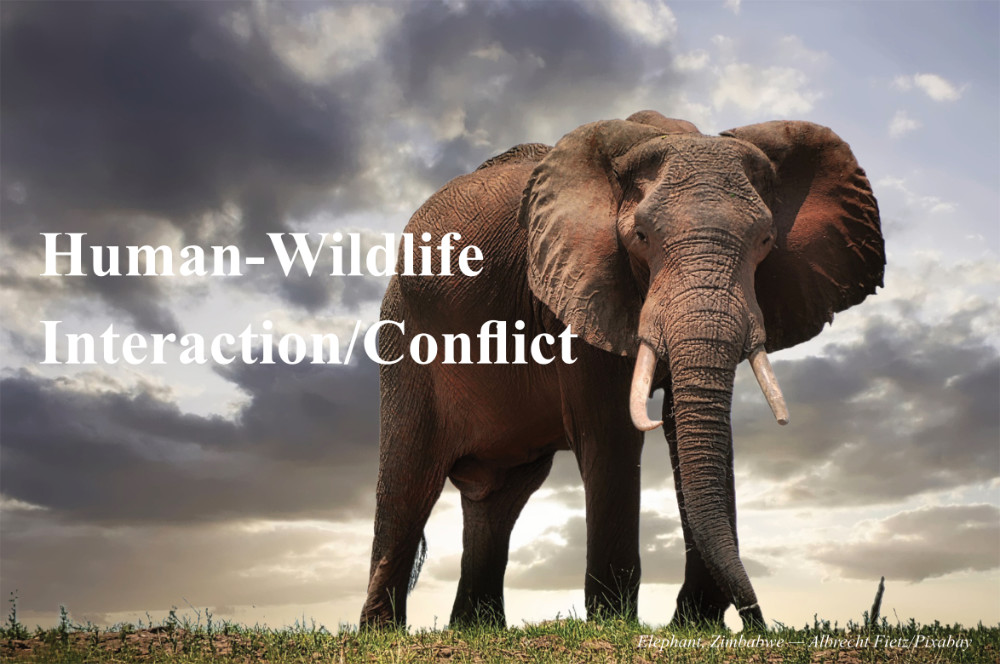
Topic
Human-wildlife conflicts are becoming more frequent, serious and widespread because of human population growth, agricultural expansion, infrastructure development, climate change and other drivers of habitat loss. Human-wildlife conflicts can occur wherever wildlife and human populations overlap, so any factor that forces wildlife and people into closer contact makes conflicts more likely.
Effectively managing human-wildlife conflicts protects communities, stops conflicts escalating, builds trust in conservation and avoids retaliation against wildlife.
Human-wildlife conflicts have unique ecological, cultural, social, historical, physical, economic and political characteristics which strategies to manage conflicts must consider.
Members
Dr Sara Platto, Pr. Animal Behavior & Animal Welfare at Jianghan University, Wuhan, China. Jenny and Dr James Desmond, co-founder Liberia Chimpanzee Rescue & Protection (LCRP). Dr Aadil Kazi, Head of the Department of Wildlife Sciences at College of Forestry, Navsari Agricultural University, India. Kiran Rahalkar, Director Human-Wildlife Interactions at RESQ Charitable Trust, Pune, India. Fidelicy Nyamukondiwa, Wildlife law advocate, founding director for Fauna and Flora Zimbabwe (FaFloZim), Provincial Coordinator Zimbabwe Human Rights Commission (ZHRC). Julius Miyengo, Wildlife Police Officer, Department of National Parks and Wildlife, Zambia. Nani Fouad and Andy Merk, co-founders Nature & Wildlife Foundation (NWA), Thailand. Benson Kanyembo, Law Enforcement Advisor at CSL Zambia. Danny Yawson, Senior Lab. Technician Department of Biological Science School of Sciences, University of Energy and Natural Resources, Sunyani-Ghana.
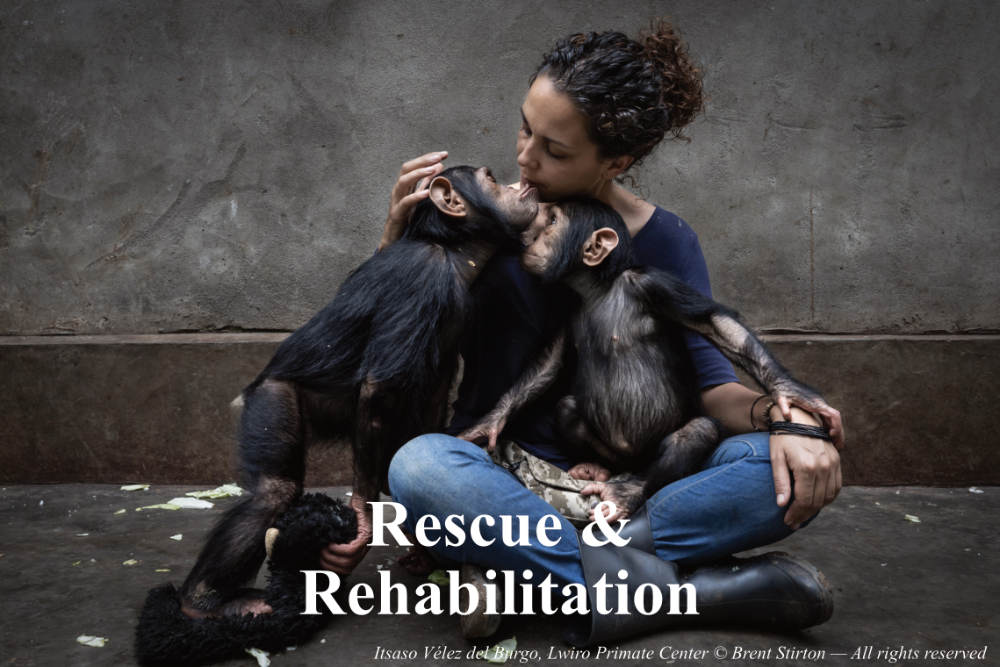
Topic
Rescuing and caring for trafficked wildlife is one of the most difficult tasks in species conservation. Many people do not realise how difficult it is to treat the physical and mental injuries caused by trafficking, whether for bushmeat consumption, poaching for traditional medicine, zoos or the pet trade.
Through the expertise of its members, partners and guests, ICBT’s working groups aim to inform widely about this very worrying issue and to propose several solutions to mitigate it.
Members
Itsaso Vélez del Burgo Guinea, Technical Director at Lwiro Primates Rehabilitation Center (LPRC) in DR of the Congo. Grace and Dr Paul Yoxon, co-founder International Otter Survival Fund (IOSF). Jenny and Dr James Desmond, co-founders Liberia Chimpanzee Rescue & Protection (LCRP). Dr Sara Platto, Pr. Animal Behavior & Animal Welfare at Jianghan University, Wuhan, China. Tuhin Satarkar, Director Wildlife Division at RESQ Charitable Trust, Pune, India. Nadeem Shehzad and Mohammad Saud, Secretary and President of Wildlife Rescue, Delhi, India. Dr. Deba Kumar Dutta, conservation biologist, Coordinator of WWF-India. Franck and Roxane Chantereau, Co-founders of the J.A.C.K. Primate Rehabilitation Centre, in DRC

Topic
Animal law is a combination of legislation and case law in which the legal, social or biological nature of non-human animals is an important factor. Animal law encompasses pets, wild animals, animals used in entertainment and animals bred for food and research.
Progress has been made in several countries in this area, but it is clear that there is still a long way to go. This ICBT working group will regularly review the legal situation around the world, assess the various obstacles (political, economic, social, cultural) that prevent or delay the improvement of the living conditions of animals in legislation, and suggest a way forward depending on the particular context of the country and region under consideration.
Members
V.Victoria Shroff, Animal Lawyer-Educator, Adjunct Professor at Allard School of Law, Canada. Hira Jaleel, lawyer from Pakistan specializing in Animal Law. Dr Sara Platto, Pr. Animal Behavior & Animal Welfare at Jianghan University, Wuhan, China. Marie-Bénédicte Desvallon, Lawyer at the Paris Bar, Solicitor of the Senior Courts of England & Wales, Founder of the law firm WAT & LAW, President of the Association Avocats & Droits de l’animal. Jenny and Dr James Desmond, co-founder Liberia Chimpanzee Rescue & Protection (LCRP). David B. Casselman, Lawyer, Founder Ecoflix, Founder Cambodia Wildlife Sanctuary. Fidelicy Nyamukondiwa, Wildlife law advocate, founding director for Fauna and Flora Zimbabwe (FaFloZim), Provincial Coordinator Zimbabwe Human Rights Commission (ZHRC).

Topic
Education is key to changing our behaviour towards nature, to learn to show more respect for other species, to understand our interactions with the rest of the living world and with our environment as a whole. Some of our members have been involved for a long time in education, providing free courses for children, organising workshops.
More generally, information in different forms (news, films, social and traditional media campaigns) is also crucial to raise awareness on biodiversity issues. This ICBT working group (IWG) aims to find the best ways to reach as wide an audience as possible. In particular, we would like to form a special supporter group of celebrities of different nationalities who can influence both their compatriots and, eventually, an international audience.
Members
Pei F. Su, Founding President ACTAsia. Ben Yoxon, Education Officer and head of Team Otter Education programme at International Otter Survival Fund (IOSF). Nachiket Utpat, Director Outreach at RESQ Charitable Trust.